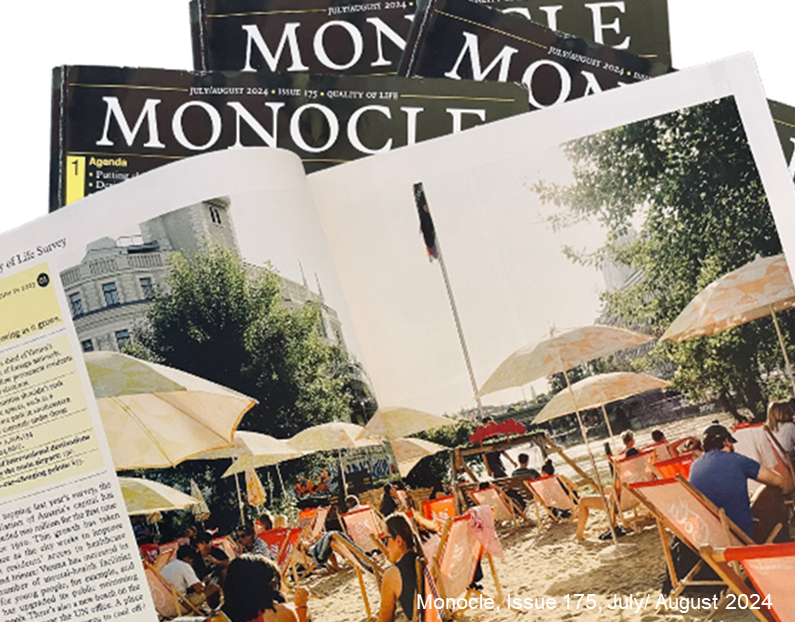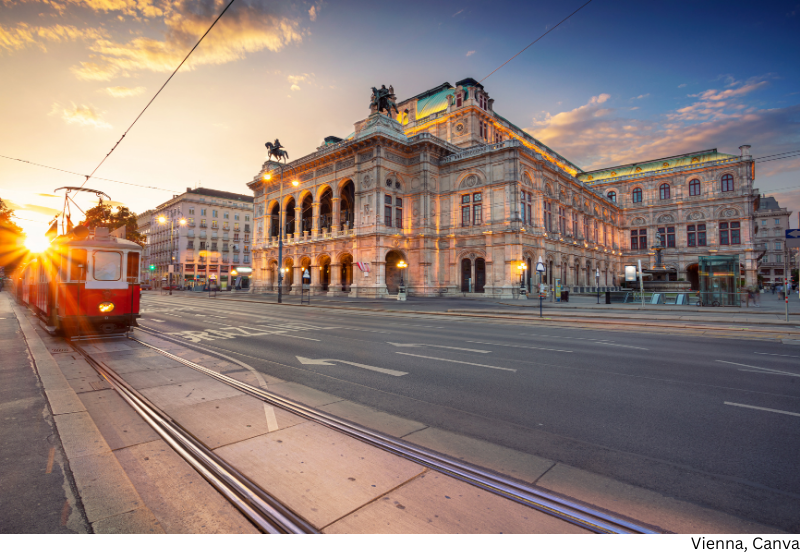Monocle’s 2024 Quality of Life Survey: What Makes a City Truly Exceptional?
Following on from our last blog post on EIU's rankings of most liveable cities, we will be taking a look at Monocle's 2024 Quality of Life Survey, which has just been released. Monocle offers fresh insights into what makes a city truly exceptional, blending rigorous quantitative data with qualitative insights from local experts and correspondents.
This year's survey highlights emerging priorities, such as life expectancy, in a rapidly changing world. With cities worldwide investing heavily in urban development, infrastructure, and sustainability, challenges like housing affordability, crime, and environmental concerns persist. The survey considers the complexities of urban living, balancing growth and quality of life. Here, we explore the top 20 ranked cities then take a closer look at why Vienna is a prime example of a city adapting to modern challenges while maintaining high standards of liveability.
What’s New in 2024?
Monocle’s Quality of Life Survey, now in its 16th edition, continues to evolve. This year, the survey places a new emphasis on average life expectancy, reflecting growing concerns that younger generations in some countries may live shorter lives than their parents. This new focus adds another dimension to our understanding of urban liveability, alongside traditional metrics like green spaces, cultural vibrancy, and public services.
Key Trends and Highlights:
- Urban Development and Infrastructure: Cities are investing heavily in infrastructure projects to boost public transport, sustainability, and urban revitalisation. Noteworthy examples include Paris’ Grand Paris Express, Milan’s new metro lines, and Singapore’s Park Connector Network.
- Housing and Affordability: Housing challenges persist globally, with high rents and shortages affecting cities like Athens, Sydney, and Paris. Addressing these issues remains a critical focus.
- Cultural and Economic Vibrancy: Cities are flaunting their cultural richness and economic dynamism. Tokyo's tourism boom, Berlin’s vibrant cultural scene, and Munich's status as a business hub are prime examples.
- Environmental and Sustainability Efforts: Cities are prioritising green spaces and sustainability. Oslo’s green initiatives, Madrid's revamped public spaces and Singapore’s urban redevelopment highlight these efforts.
- Public Services and Quality of Life: Enhancements in healthcare, education, public transport, and safety are common themes. Efforts to address mental health in Vienna, crime in Milan and public transport upgrades in Sydney are part of this trend.
- Tourism Impact: Tourism significantly impacts local life and infrastructure. Issues like overcrowding in Kyoto and tourism surcharges in Barcelona reflect the challenges cities face.
- Local Challenges and Solutions: Each city has unique challenges and solutions, from managing overcrowded tourist spots to improving transportation and handling economic pressures.
These themes highlight the complexities and dynamic nature of urban living, with cities balancing growth, sustainability, and quality of life.
Monocle’s 2024 Top 20 Most Liveable Cities
|
Ranking |
|
Average | ||||
| 2024 |
2023 |
City |
Brief description |
Life Expectancy1 (Years) |
Cost of cappuccino2 (€) |
Monthly Rent 1-Bed Apt2 (Centre) (€) |
|
1 |
3 |
Munich |
Germany’s economic and intellectual hub nurtures talent, cultivates a healthy environment and boasts the country's highest average life expectancy whilst investing in sustainable living initiatives. |
81.54 |
3.83 |
1,443.67 |
|
2 |
1 |
Vienna |
Praised for its mental-health services, adding recreational spaces and building new municipal housing to support its growing population. |
82.12 |
3.88 |
1,012.86 |
|
3 |
4 |
Zurich |
A city boasting high life expectancy, active residents, expanded public transport infrastructure, and a thriving food scene, with record tourism. |
84.09 |
5.56 |
2,247.38 |
|
4 |
2 |
Copenhagen |
Construction is underway in the future-ready booming Danish capital including five new Metro stations, the Lynetteholm island project and a children's hospital. The new Opera Park adds green space. |
82.09 |
5.86 |
1,600.65 |
|
5 |
8 |
Madrid |
The city has undergone significant urban upgrades, including a new green corridor and revamped public spaces, featuring 22 Michelin-starred restaurants, 584 bookshops, and a strong focus on sports. |
83.80 |
2.45 |
1,379.68 |
|
6 |
9 |
Lisbon |
Beautiful, safe and surrounded by nature, the city has attracted foreign investment, tourists and digital nomads, but must now balance the benefits with rising house prices and cost of living for its residents. |
82.55 |
2.38 |
1,375.00 |
|
7 |
6 |
Tokyo |
Japan's economic hub with low unemployment, top-tier food, retail, and art, and rooted in craft heritage. Record tourism boosts the economy but leads to litter, long queues and taxi shortages. The city is prioritising social initiatives for families and seniors. |
84.85 |
3.18 |
878.04 |
|
8 |
10 |
Melbourne |
An all-rounder city with world-class amenities, excellent healthcare and education, a buoyant economy and a vibrant creative scene, with parks and surf beaches around the corner, but faces housing shortages and public transport issues. |
84.07 |
3.17 |
1,359.81 |
|
9 |
5 |
Stockholm |
A city invested in public infrastructure: improving connectivity; culture; and climate leadership with the upcoming implementation of a fossil-fuel-free zone. Its housing market shows signs of improving, with a new neighbourhood planned near Bromma Stockholm Airport, comprising 22,500 new homes. |
83.42 |
3.97 |
1,412.64 |
|
10 |
12 |
Paris |
The Olympics accelerated urban development, especially in the northern suburbs. The Metro expansion will transform public transport, though the Games has fuelled a rental crisis, and it remains one of the costliest cities to live in Europe, and security issues persist. |
83.46 |
4.03 |
1,316.02 |
|
11 |
7 |
Helsinki |
Among the world's greenest and cleanest cities with high public trust in its police. Continually seeking improvement, it is safe, egalitarian, and offers excellent schools and public services. Its gastronomic scene has fluctuated post-pandemic, and roadworks pose challenges as the city upgrades its infrastructure. |
82.08 |
4.49 |
1,053.89 |
|
12 |
16 |
Kyoto |
An ancient city, rich in culture, nature, and cuisine, attracts tens of millions of visitors yearly, overwhelming its 1.5 million residents. Plans to address overtourism and rising housing costs include improving transportation, waste management, and preserving cultural heritage. |
84.85 |
2.46 |
534.71 |
|
13 |
19 |
Oslo |
The compact Nordic powerhouse, known for its vibrant start-up scene and green initiatives, is expanding bike lanes and reducing cruise ship pollution. Despite space and housing challenges, the city offers high-quality dining and continually strives to become more liveable. |
83.46 |
3.97 |
1,317.03 |
|
14 |
13 |
Amsterdam |
The sustainable tech hub emerges as an AI centre, investing in urban projects such as transforming a former naval base into a leisure complex and maintaining clean canals. Challenges include housing affordability and rising cycling accidents, while public health efforts are steering it to become the first city to end new HIV infections. |
82.30 |
3.93 |
2,028.85 |
|
15 |
14 |
Sydney |
A thriving harbour city is expanding public infrastructure with new metro lines and 46 stations linking suburbs to the city centre. However, roadworks are prevalent, high housing costs and a struggling retail and hospitality sector persist post-pandemic and due to inflation. |
84.07 |
3.08 |
1,995.86 |
|
16 |
New entry |
Barcelona |
The mediterranean city faces a post-pandemic tourism surge, sparking local pushback. Plagued with rising petty crime, and declining retail occupancy, policies such as increased tourist surcharges, aim to fund improvements and balance tourism with quality of life, keeping the city vibrant and attractive. |
83.80 |
2.30 |
1,240.82 |
|
17 |
11 |
Berlin |
The laidback cultural mecca with 170 museums and significant green space and open-air arts space investment, and extensive bike lanes cutting commuter traffic. However, its cultural sector faces challenges due to recent geopolitical conflicts. |
81.54 |
3.66 |
1,268.21 |
|
18 |
15 |
Singapore |
A driving force in urban redevelopment and sustainability: 3,405 new restaurants opened in the past year; the Park Connector Network aims for every home to be within 10 minutes of a park by 2030. Changi Airport is introducing passport-free security, and upgrades are planned for the Malaysia-Singapore land border. |
83.86 |
4.37 |
2,485.92 |
|
19 |
18 |
Milan |
The design and business hot spot, Italy’s leader in job security, investment and cultural diversity, with notable arts and gastronomy openings. It has improved transport connectivity, bike lanes and redesigned piazzas, such as Piazza Duomo. Though, it has seen an uptick in crime and pollution. |
83.87 |
1.86 |
1,336.88 |
|
20 |
17 |
Athens |
The city set a tourism record with 7 million visitors last year, igniting a cultural renaissance. A thriving creative scene and relatively low rent attract artists, and its culinary reputation grows. However, challenges include pollution, rising rents, public transport issues and extreme heat, while the Ellinikon project drives its urban regeneration efforts. |
83.03 |
3.39 |
584.82 |
1 Data source: https://www.numbeo.com/cost-of-living/, accessed 15 August 2024
2 Data source: https://www.worldometers.info/demographics/life-expectancy/, accessed 15 August 2024
Vienna: A Decline in Ranking but Not in Standards
Vienna, often celebrated for its exceptional quality of life, ranks second in the 2024 survey, a slight drop from its first-place position in 2023. Despite this, Vienna remains a model for urban liveability, excelling in key areas:
- Mental Health Focus: A concern intensified and highlighted by the pandemic, Vienna has expanded its mental health services, particularly for young people. New initiatives include a support hotline providing “first-level support”, with online chat and video support planned. A pilot app will aid continuous care in child psychiatry, aiming to detect and prevent early relapses, and collaborations with influencers will also help destigmatise mental illness.
- Cultural and Leisure Facilities: Vienna's cultural scene is thriving, with highlights like the Wien Museum's reopening (free entry to its permanent exhibition, a first in Austria) and new public swimming facilities, reflecting the city’s commitment to holistic well-being. Projects like the “Arena Beach” on the Danube exemplify Vienna’s commitment to accessible green spaces.
The city's '2030 pool strategy' aims to provide all Viennese with bathing and swimming opportunities, especially children. With a €115 million investment, Vienna is building five new indoor pools and upgrading 30 existing ones, including high-profile renovations like the city's longest water slide (102 metres) at the Schafbergbad in Währing and the wave pool at the legendary Gänsehäufel lido. Two new sports pools are underway: a second pool at Großfeldsiedlungsbad with planned completion this September; and a pool at Simmeringer Bad, due to open in 2025. In addition, the city is constantly upgrading the facilities, such as a new slide at Reinlgasse family pool in Penzing, where children can splash around for free (as in all eleven family pools). - Housing initiatives and sustainability: Vienna's newest Gemeindebau (municipal building), located at Dr.-Natterer-Gasse in the 2nd district, exemplifies the "Vienna Model" of affordable, sustainable, and community-focused living. This low-energy residential complex, built on a former parking lot, features 118 apartments, green spaces, district heating, photovoltaics, and amenities like a doctor's surgery, bicycle storage, and a children's playroom. The project underscores Vienna's commitment to affordable housing, at a time where, globally, house shortages and rising rents are becoming increasingly common. Since 2015, Vienna has completed 10 such projects, reinforcing its status as a leader in liveability and social sustainability.
- Award-Winning Food Initiatives: In 2023, Vienna won ‘Best Organic City’ at the EU Organic Awards, with its municipal food brand Wiener Gusto. Building awareness of organic food and bringing affordable, organic food to the city's residents, it contributes to sustainability and climate protection.
Looking Ahead
Vienna’s slight drop in rankings does not overshadow its status as a top global city. For the first time since 1910, the population of Austria's capital has exceeded two million. Its continuous efforts in affordable housing, public transport, and cultural investment keep it at the forefront of urban liveability. As the city adapts to new challenges and opportunities, its commitment to improving quality of life remains steadfast.
Monocle’s survey reminds us that liveability is multifaceted and ever evolving, reflecting both global trends and local innovations. Vienna’s enduring focus on sustainability, affordability, and cultural vitality ensures it remains a benchmark for urban living.




